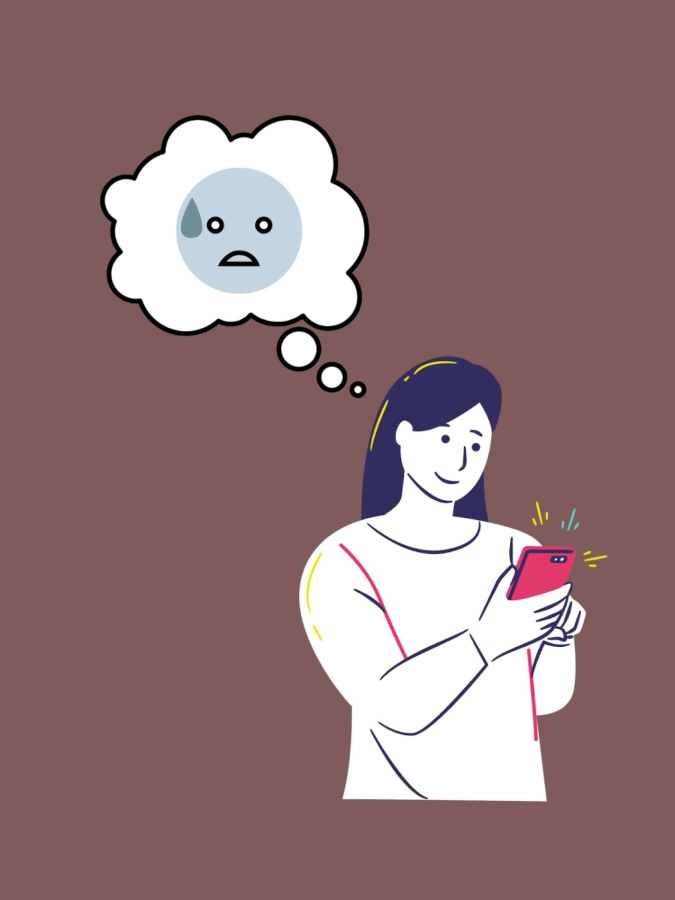Unwilling to help ourselves
December 6, 2022
At a family wide Thanksgiving, I look around and see 8 out of the 12 people scrolling through their phones. They are all scrolling on social media. It’s an addiction; Snapchat, Instagram, Facebook, and TikTok, all of these apps are the most common among teens and adults. Social media has a negative affect on mental health, this is known. So why would we keep something that hurts us?
The Survey
A West Ottawan survey of over 60 people asked: Do you have anxiety? Is it diagnosed? How does social media affect your anxiety? Why do you keep social media? These surveys were spread around to different students in all grades at WOHS.
Results
The results showed the majority of those who have anxiety find social media to increase their anxious feelings. A student from the anonymous survey said, “Sometimes I’ll open an app like instagram and see people hanging out during the holidays and it makes me feel alone. Twitter always makes me worried about something new, whether it be because of the news or individual users.” Another student said, “I think when anxious or panicky, being attached to your phone can make it harder to calm down. It also causes people to struggle with comparison and self-image issues which just increases these anxious characteristics.”
Comparison is at the heart of the problem
Comparison. Comparing ourselves to peers, people who seem to be perfect. There is a desire to be liked by everyone, and if people don’t get that certain amount of likes on a post, they convince themselves something is wrong with them. An anonymous student from the survey said, “Sometimes I feel anxious about how I look compared to how other people look. Also, I would always think that if I didn’t have more than 100 likes on a post, people didn’t like me anymore.”
Another student said, “Seeing others doing a lot better than you can sometimes make you feel like you aren’t good enough.” No one should ever have to feel less about themselves just because of what they see online. Social media was originally created for a positive place to post life updates, now it has turned into everyone showing off their perfect aspects of life. WOHS alumni Charlotte Anderson who is diagnosed with anxiety said, “People only share the best sides of themselves on social media. When I am scrolling through Instagram for instance, I see people on vacation, going to events, hanging out with friends, or cute photos of themselves. For me, it makes it seem like everyone is living these amazing lives and I’m not. But the truth is that people don’t post when their lives are just normal or when they are having a bad day. Social media is not a good representation of reality.” The media has been convincing others to dislike themselves, that is not the message that should be spread on a platform almost every teen has.
I personally find myself looking at girls with their “perfect gym bodies” or their “influencer lives.” When this pops up on my instagram feed, I scroll through the images. Instagram thinks I like looking through these types of posts, so it constantly shows up on my suggested feed. I just compare myself to everything I see. West Ottawa School Psychologist Trisha Simpson said “Even when comparing ourselves to what peers are posting online may lead to negative feelings, such as anxiety or depression. It may look like a peer is living a more exciting life than we are and we may often forget that this picture is only a brief snapshot in time. Or it may feel like a popularity contest and your self worth is determined by the number of likes you receive from your posts or friends you have on your social networks.” Teenagers get so in their heads about what they look like or if they are good enough, and the media strengthens those negative feelings.
Young people let FOMO override their mental health interests
Why can’t people just delete social media if it causes so much anxiety? Simpson said, “I think FOMO plays a big role. In addition, situational factors also play a role. Social media sites often are used as an avenue of getting information out to others, such as invitations, announcements, and updates. Teens and adults may feel that belonging to a social media site is required in order to be kept updated on info that they need.”
Snapchat is a main source of communication for many teens and young adults. Someone is more likely to ask for a person’s Snapchat username then their number, it is just how the word gets around. Instagram is a platform where people will post what goes on in their lives. Everyone is always curious about what happens in other people’s lives and these applications give a person the information they need, that’s why people just keep coming back to social media.
Almost every student who filled out the survey said social media apps are a good way to keep in contact with friends. People, especially teens, communicate via Snapchat and Instagram. Anderson said, “It is a very helpful way to stay in contact with distant family members and people you don’t see everyday. I keep social media because it is trendy and there is the feeling of wanting to fit in. As much as I hate to admit it, it feels really good when you get a lot of likes on your posts and a lot of comments. I think part of the reason I keep social media and post on it is because I want validation and gratification.” Social media is not something people are planning to delete no matter the impact on mental health it has. So maybe we make social media casual and real like it is supposed to be. We all know we aren’t perfect, so we should show we aren’t perfect online.




